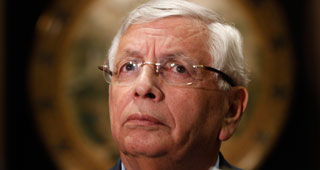So here we are: The two sides have come to agreement on the economic split, with the players having come all the way down to the NBA’s number at 50 percent. And yet we may still not be approaching a new collective bargaining agreement.
The revised deal that the league has submitted as its best offer leaves a bad taste in the mouths of many players. It strikes them as an overreaching, even vindictive, attempt to drive down salaries and dampen free agency.
The distaste is strong enough that the players may be willing to forfeit the season, and a guaranteed $2 billion in income, if they turn down the proposal or never even get around to a formal vote.
The league’s insistence on a new structure to the salary-cap system is rooted, we are told, in the owners’ desire to create a more fan-friendly league with parity and the ability of any team to compete for a championship regardless of market size.
Commissioner David Stern and the deputy commissioner Adam Silver have repeated this motivation many times in post-bargaining-session news conferences.
But it is time for the league executives to make their case directly to the players themselves.
It’s an unusual step, perhaps unheard of, in the history of collective bargaining in professional sports. But it is called for now. And if Hunter believes he’s reached the end of trying to get blood from the NBA’s negotiating stone, he has nothing to lose by letting his members hear from the other side directly. At the very least, Hunter would be giving the NBA an opportunity to experience firsthand why its proposal will never fly.
On the other hand, if it can be successfully argued that the league’s efforts at competitive balance under the next CBA will grow the NBA’s pie into the neighborhood of the NFL’s $7B per year machine, then mathematically the players will be a lot better off with half of that pie than they would be with 57 percent under the past CBA.
The people who run the NBA are supposed to be world-class businessmen, and they do have a compelling track record of growth under this commissioner’s league office. Stern and Silver are brilliant executives. They must have some brilliant reasons for how and why their new system will make the NBA more successful than ever. They must be brilliant at persuading others of the truth of their position, and bringing diverse interests together to make a deal. All of these things are in the job description of great business leaders.
Live and in person, let the players hear from the owners’ lead representatives.
This will more than likely be Stern’s last labor dispute as NBA commissioner. His career finale should happen with a microphone standing in front of a hostile crowd of employee-athletes, explaining to them how this deal will remake the league into an even bigger economic powerhouse than the one he helped build so far.
Save the season by telling the players why this new CBA will make them richer and put the league that Stern will leave behind in stronger shape than ever.
It might also be a healthy exercise to open it up for a question-and-answer session and let the players, with whom the owners have driven such a hard bargain, press for answers and vent their frustration.
Stern and Silver can take all of that but still explain to their locked-out employees why taking this deal will be a terrific thing – or at least a necessary thing – for them and future generations of players. Maybe by the time they leave, the crowd won't be so hostile anymore.
As two high-powered attorneys by training, Stern and Silver should know that they will be the expert witnesses on the stand under intense cross-examination for an hour or two.
Then let the jurors vote and deliver their verdict.


